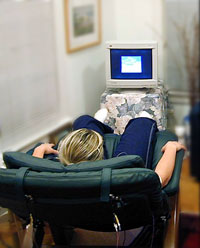Neurofeedback as exercise
Neurofeedback, like aerobics, weight training, walking, fast walking, etc., is simply a form of exercise using a biofeedback device like the fitbit to monitor and encourage progress. A neurofeedback therapist is simply a fitness coach with extensive knowledge of the brain and of self regulatory techniques. Neurofeedback addresses a large number of psychiatric and emotional issues, in the same way fitness training addresses a large number of physiological issues, simply by providing graded, monitored and behaviorally rewarded brain exercises that move the brain into a more centered, and regulated place, just the way physical fitness reduces cholesterol and blood pressure.
Because the brain is extremely sensitive, neuro providers have to know what they are doing. And because so many of our clients have psychiatric conditions, we need to be proficient in diagnosis and treatment of those conditions, or we’ll be in malpractice and harm patients
However neurofeedback, and all biofeedback, techniques, simply teach self regulation. Self regulation just happens to be at the root of many, many issues.
As far as ADHD research, if you look at ALL the literature (and I’ve looked at most of it), NFB outperforms stimulant medication in about 80 % of the cases studied only because the effects aren’t reversed when the nfb training stops. As you know, stimulant meds + CBT and parent training, out perform stimulalnt meds alone – and stimulant meds alone are effective in about 40% of treatment cases, but the gains are reversed when the stimulant meds are withdrawn. With nfb the treatment effects remain after 40 treatments in about 80% of all clients treated. When we did the demonstration project at TIFFE (with protocols I disagreed with), we got 75%. That’s not a placebo effect. (if I remember correctly that’s about 30%) And it’s way better than stimulant meds.

